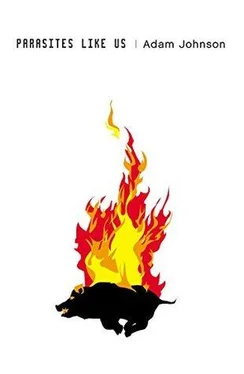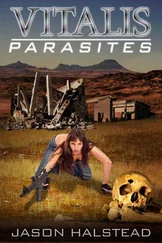“Well, I’m pissed off,” she said, sounding reluctantly justified. “I’ve got good ideas. My Clovis theory isn’t even out there in the literature. Nobody’s articulated it. And all I hear about is Eggers. What’s his idea? He doesn’t even have one. He has a gimmick.”
“Trudy, I recruited you, remember? I’ve always believed in you. I don’t know how you’ll ever prove it, but your dissertation hypothesis is brilliant. For a culture based on making animals extinct, to fuse weaponry and art only makes sense. The part about women carving all the spear points while the men hunted — well, you’ll maybe have to gather more data on that.”
“I’ve smelled Doritos on him,” she said and paused to let that sink in. “Dorito breath is unmistakable. Did you know he doesn’t read the textbooks he assigns? He doesn’t even use chalk, because it’s ‘technology.’ He gives his tests orally, and gets one of those girls of his to bubble in the grades on his grade sheets. Do you know how many bubbles I bubble in? And he’s Mr. Primitive? Look at how I live. I steal toilet paper from the faculty bathroom. I’m eating noodles and oil in here. If my car breaks down. I’m the one who has to fix it.”
“Doritos, huh?”
“Spicy Taco flavor.”
“Look, Trudy, I’m going to need a favor from you.”
“I’m not done yet,” she said.
I put my hands up, as if to say, No offense, I come in peace.
“That was my fellowship,” she said, pointing at me. “Mine.”
Trudy looked as if she was gearing up for a speech, but then, as if she’d heard her own words from afar and decided she didn’t like their tenor, she stopped. “Okay, I’m done now,” she said.
I waited a moment, to be sure she was through, then said, “This favor I need, it involves meeting Eggers, but the favor’s for me.”
Now she waited a moment, looking at me with her head cocked.
“Is that for real?” she asked. “That this fellowship’s named after your mother?”
The fellowship was in honor of Janis, but I didn’t correct her. I didn’t answer at all. Trudy seemed to see in my eyes that this was a subject about which I would not lie. She shook her head, as if disgusted with herself, then disappeared into her dorm room and returned with a heavy scarf.
“Okay,” she said. “Let’s go.”
We crossed the courtyard together, passing a solitary picnic table frosted with white. Trudy steered me around the blanket of snow that hid the sunken volleyball pit. Black slush lined the edge of the Honor Roll Parking Lot, and as we trudged through it, heading for the quad and Eggers’ lodge, I couldn’t help noting the natural grace and authority with which Trudy moved.
It would be less than ethical of me if at this point I did not confess that I believed Trudy was the ultimate female specimen. Intelligence and beauty aside, and from a strictly professional anthropological perspective, her body was perfectly evolved — tall frame, thick bones, and long muscles — a decathlete’s physique. Her back flared into broad, square shoulders that framed a strong chest marked with small and unobtrusive breasts, and she carried just enough fat to optimize insulation and energy reserves without compromising mobility. I’d seen her body articulated once as she swam butterfly inside the jade cube of the Carney Aquatic Center, the points of her rotator cuffs launching each stroke, causing a wave that ran through pectorals, abdominals, and quadriceps before she cracked into a dolphin kick with the cablelike snap of her Achilles tendons. This was not the body of a gatherer. This was a person who could walk into any society, historic or prehistoric, and demonstrate abilities that were absolutely commanding. Of course I kept such thoughts to myself, lest I appear lecherous, or just plain old-fashioned.
We followed a thin column of woodsmoke toward Eggers’ lodge, which lay in the darkness ahead. Janis was a shadow in the trees uphill from us, and the whole campus was quiet except for one soul. Out in the quad, a lone student was running the fitness track in the late cold. He jogged in his parka until he reached the pull-up station, where his breath plumed upward each time his chin crested the bar. After a certain number, he ran on.
Eventually, we reached the muddy, snowless circle that surrounded the lodge, and were met with the charring smell of an odd, sour meat. With a lift of the flap, Eggers emerged in a bizarre set of pantaloons and a huge serape of black fur. He saw we were looking at the strange hat of rabbit hides on his head. “It’s not finished,” he said. “Come on. I spend half my life gathering wood, and the other half melting snow.”
“Here we are, Eggers,” I said. “What’s this favor?”
“It involves our new Clovis point,” he said.
Trudy narrowed her eyes at him.
“There are no new Clovis points,” she said. “Unless you think you’re the one person in the world who can make them.”
“I have a real one,” Eggers said, “and we’re going to use it.” He ducked into his lodge and returned with a heavy spear, about two and a half meters long, the pink Clovis point bound to the end with some kind of thin fiber.
“Are you crazy, Eggers?” I asked. “This is an artifact. It’s invaluable.”
“No, sir,” he said. “This is a tool, made to be used, and the only thing I still need to do for my dissertation is bring down a large herbivore. This is your idea, Dr. Hannah. This is straight out of The Depletionists. I don’t care what your critics think. I read that book ten times. Your book is why I’m doing this.” He gestured at his lodge, his clothes. “Don’t you want to see if it’s true, if this point can really do it?”
“There’s no need,” I told him. “These points have been found lodged in mammoth and mastodon bones. There is no doubt they kill.”
“You can shoot an African elephant ten times with a rifle and it will only get angry,” Eggers said, gesturing a little wildly with the spear. Trudy and I backed up a step. “Fifty years later, when that elephant dies of old age, it leaves bones with bullets in them. Maybe your mastodons were the ones that got away. You ever think of that? But how can you know, without research and testing?”
Trudy laughed. “And where are you going to find a mastodon?”
Eggers turned to me. “All I need is an animal that weighs at least a thousand pounds. Isn’t that right, Dr. Hannah?”
“Well,” I said, “I suppose.”
My head was starting to spin a little. I kept seeing pink spears flying into the future — where would they land? Most of my colleagues believed climate change at the end of the Ice Age had killed off all the big animals in North America, which caused the Clovis to starve and disband; but I’d staked my whole career on the belief that a Clovis point could take down any animal. Yet Eggers was right — I’d never seen a kill.
“Where are you going to find a thousand-pound animal that no one’s using?” Trudy asked. “Those guards at Hormel mean business. They’d grind you up and turn you into an Eggers burger.”
“Don’t you worry about Eggers burgers,” Eggers said. “Eggers has this all planned out.”
I put a hand on Eggers’ shoulder. “Is this the bad news?” I asked. “You know, the bad part of the good-news/bad-news thing?”
“The bad news comes tomorrow,” he said. “This is the celebration part.” With that, Eggers began backing into the darkness of the quad.
Trudy and I stood there a moment, looking at each other.
“Did you see that Clovis point?” she asked. “A woman made that. I know it. It took her hours, sitting around a mineral deposit with her friends. She talked and told stories while her hands worked the quartz. She chose the material for its beauty, because this was her art, and the design was taught to her by her mother — the keeper of a thousand years of hunting technology.”
Читать дальше












